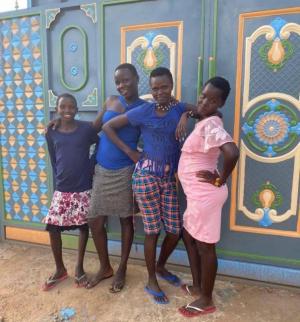Cape teacher seeks funds for Kenya sewing school
Cape High teacher Alayna Aiken’s mission to create a sewing school in the small village of Turkwell, Kenya, is in need of funds to finish basic construction items after unexpected budget hits.
“We can’t go back to operating at our small-scale school until the housing is done for our teachers and students,” Aiken said.
Aiken launched the school several years ago after she visited the area on a mission trip and met members of the impoverished Pokot tribe. Sewing has empowered them and created a newfound pride among a people who were abandoned by their government, Aiken said.
The local chief allocated property and houses for Kenya Gather, Aiken’s organization, to build a polytechnic school. Three houses given to Aiken were formerly used as temporary housing for workers building a hydroelectric dam in the 1980s.
“Seeing the conditions, we knew they needed to be rebuilt before we could house students in them,” Aiken said. “We received a grant for $45,000 to begin the work.”
One house will be for teachers and sanctuary students, many of whom were child brides, in need of adult supervision to help prevent them from becoming prostitutes, Aiken said.
“Sanctuary students are young women who have left their abusive husbands,” Aiken said. “Or, sanctuary students can be girls, about 14 years and older, who do not want to get married or have female genital mutilation performed on them, and have run away from that. Our school has become a safe place for such situations. We work to heal their wounds and teach them a trade so they can provide for themselves.”
Another house will be for older or married students, or up to four single women if bunk beds are used; each unit has a living and dining area, kitchenette, bedroom and bathroom, she said.
The third house is for the school administrator and for guest housing for incoming mission teams, Aiken said. Next year, the school is set to inherit three more houses, which will be remodeled for future needs.
Kenya Gather board member James Odenyo, a civil engineer, hired a team of skilled and unskilled laborers to renovate the homes. He later said he knew the budget would not cover design plans, but refrained from saying so initially because he wanted to make them a reality, Aiken said.
“He later told me that six-foot-wide custom-designed windows cost three times as much as standard windows, but the beauty of the area required that we maintain the design,” she said. “This was the first hit to our budget, but we were still at the beginning so it seemed we would work it in.”
The second house had major termite damage; when a storm came through, it collapsed.
“The locals saw this as a sign that God was against us, but our men picked up the pieces and continued to build the walls,” she said. “This also became the second hit to our budget—we had to replace the wood, which is much more expensive in Kenya, and rebuild all the trusses.”
Workers decided to ensure the school compound would always have water by connecting three water supply lines to the school water pump and designing a three-story water tower able to hold nearly 8,000 gallons of water, which Aiken said was the third and biggest hit to the budget.
The fourth budget hit occurred when the window welder did not follow original plans, Aiken said.
“We hired a team of more experienced welders to work on-site to modify the windows and make them closer to the original vision,” Aiken said. “Things like screens and in-swing windows are unusual, and the original welder was unwilling to try something different, but we are getting there slowly by slowly.”
The houses are uninhabitable until plumbing, electricity and masonry are complete, Aiken said.
“It is significantly less expensive to complete them all at once because parts of the job are interdependent, and our tradesmen have to travel a great distance,” Aiken said.
About $13,000 will cover remaining masonry, electrical and plumbing work; appliances; cabinetry; windows; ceiling fans and window AC units; bedroom, living and dining room furniture, said Aiken, who plans to return to Kenya over Christmas and Easter breaks to continue work at the school.
Donate and purchase masks to support the sewing school at Kenyagather.org.












































